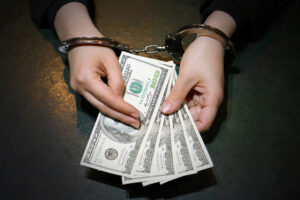When someone is arrested, securing their release from jail typically involves posting bail. In many cases, a bail bond is obtained to cover the bail amount when the defendant or their family cannot pay the full amount upfront. Bail bond companies act as a surety, guaranteeing the defendant’s release for a fee — a certain percentage of the total bail amount (12% in Louisiana).
To further reduce risk, bail bond companies often require collateral in addition to the fee. But what exactly is collateral, why is it needed, and what can be used? Here’s what you need to know.
What Is Collateral in Bail Bonds?
Collateral in bail bonds is an asset pledged by the defendant, or someone on their behalf, to secure the bail bond. The purpose of collateral is to ensure that the bail bond company does not incur a financial loss if the defendant fails to appear in court. If the defendant adheres to the terms of the bond — namely, appearing in court for all required hearings — the collateral is returned to the individual who posted it. However, if the defendant skips court or otherwise violates the conditions of their bond, the bail bond company can seize the collateral to cover the bail amount.
Why Is Collateral Required?
Bail bond companies assume a significant risk when they post bail on behalf of a defendant. If the defendant does not show up in court, the company is responsible for paying the full bail amount to the court. Collateral serves as a safety net to offset this risk. By securing an asset, the company has a way to recover the amount they risk losing.
Not all bail bonds require collateral, but it’s more likely to be requested in cases where:
- The bail amount is very high.
- The defendant has a history of not appearing in court.
- The defendant lacks strong community ties or financial stability.
Key Requirements Collateral Must Meet
When offering collateral in a bail bond agreement, there are a few important factors to keep in mind. Here’s a breakdown of what you need to know:
Collateral Must Have Sufficient Value
The collateral you provide must be valuable enough to cover the full amount of the bond, minus the bail bonds agent’s fee. This means the collateral should be worth at least as much as the bail you’re trying to secure. For instance, if bail is set at $10,000, you’ll need to offer something worth that amount or more. This ensures that the agent will recover their money if you don’t show up for court, as they’re taking a financial risk on your behalf.
Collateral Should Be Easily Convertible to Cash
The collateral must be something that the bail bonds agent can quickly and easily sell for cash if necessary. Assets that take time to sell, such as artwork or antiques, may not be suitable, even if they’re valuable, as they could take too long to liquidate. Cars, on the other hand, are a good example of liquid collateral since they can be sold quickly if you or a loved one fails to meet court obligations.
Collateral Must Be Real and Transferable
The collateral should be something you legally own and can transfer to the bail bonds agent. Items such as vehicle titles or land deeds are ideal since they are tangible assets that can easily change ownership. Conversely, things like copies of documents or difficult-to-value collectibles might not be accepted, as they cannot be easily transferred or their worth is hard to determine.
Collateral Cannot Already Be Pledged
Finally, the collateral you use cannot already be tied up as security for another loan or bond. For example, if you’ve already taken out a mortgage on a house, it likely won’t qualify as collateral since the property is already pledged to another financial institution. Similarly, if stocks or bonds are already securing a loan, they may not be eligible to serve as collateral for the bail bond.
What Can Be Used As Collateral?
Bail bond companies accept a wide range of items as collateral. The type of collateral can vary depending on the company’s policies and the value of the asset compared to the bail amount. Common forms of collateral include:
1. Real Estate
One of the most common and valuable types of collateral is real estate, including houses, land, or commercial property. The property must have equity, meaning its market value is significantly higher than any existing mortgages or loans on it. To use real estate as collateral, the property owner may need to provide documentation proving ownership and equity value.
2. Vehicles
Cars, trucks, motorcycles, boats, and RVs can be used as collateral, provided they have a high enough value and are owned outright (without liens or loans). The title of the vehicle is held by the bail bond company until the defendant meets their court obligations.
3. Jewelry and Precious Metals
Valuable items such as jewelry, watches, and even gold or silver bars are often accepted as collateral. The bail bond company may require an appraisal to confirm the item’s value.
4. Stocks and Bonds
Some bail bond companies accept stocks, bonds, or other securities as collateral. In these cases, the value of the securities must be sufficient to cover the bond, and the company may hold them in a secured account until the case is resolved.
5. Bank Accounts
Cash held in a bank account can be used as collateral in some cases. The bail bond company may require the funds to be placed in a secured account or deposited directly with them until the terms of the bond are met.
6. Paychecks
If the accused or someone close to them has a steady income, they can use their paycheck as collateral for a bail bond. Under this arrangement, a portion of their paycheck is automatically deducted by the payroll company to cover the cost of the bail bond. Once the defendant appears in court and fulfills all legal obligations, the bond amount is refunded. This option is advantageous because it doesn’t require extra collateral, and the paycheck deduction is generally much lower than what a bail bond company would typically charge. However, a potential drawback is that if the accused loses their job, it might become difficult to secure the necessary funds to pay off the bail bond.
7. Personal Property
In certain situations, high-value personal property such as electronics, antiques, or artwork may be accepted as collateral. The value of these items must be appraised, and the company will hold the property until the bond conditions are fulfilled.
What Happens to Collateral After the Case?
Once the defendant fulfills all court requirements — by attending all hearings and complying with the conditions of the bail bond — the collateral is returned to the person who posted it. This process typically occurs within 30 days after the case is resolved, though the exact timeline can vary by state and company policies.
However, if the defendant violates the conditions of the bail bond (for example, by failing to appear in court), the bail bond company has the right to seize the collateral. The company will liquidate the asset to recover the bail amount paid to the court. In some cases, the bail bond company may also pursue legal action to collect any remaining debt if the collateral does not fully cover the bond.
The Bottom Line
Collateral plays a critical role in securing a bail bond, providing a safety net for the bail bond company in case the defendant fails to meet the terms of their release. Various types of assets can be used, from real estate to personal property, depending on the bail amount and the defendant’s circumstances. Before posting collateral, it’s important to understand the risks involved and ensure that the defendant will comply with all court obligations to avoid losing valuable assets.
About Affordabail
Affordabail is a local bonding company. With several locations throughout the state of Louisiana, we service St. Tammany Parish Jail in Covington, Livingston Parish Jail in Livingston, Jefferson Parish Jail in Gretna, Tangipahoa Parish Jail in Amite, St. John Parish Jail in Laplace, and many more.
For more than 20 years in the industry, Affordabail Bail Bonds has been providing both families and individuals with expedient and efficient bail service. We are reliable at any time, day or night. We are always here for our clients and we treat people who require bail as people, not criminals. There is no way of knowing the circumstances behind what has happened to an accused, and we firmly believe in “innocent until proven guilty.” This respectful approach to our clients is part of what makes Affordabail better than the competition.
We process all bond payments securely, and our friendly staff is efficient and hardworking, getting all the required paperwork done as quickly as possible. We do not want loved ones to stay in custody longer than necessary. Our bail bondsman will make the entire process of obtaining bail simple and painless. Let industry knowledge work for you.
We offer payment plans, too. For more details on the types of bail bonds we offer, and to get started, call any of our locations, or fill out an online form.




